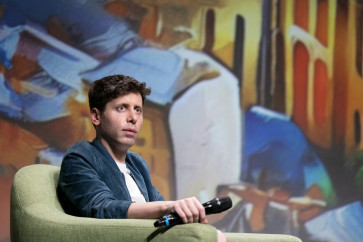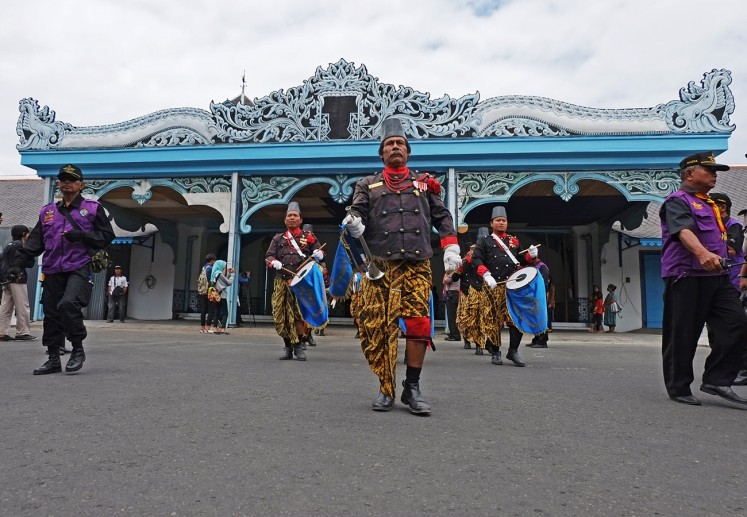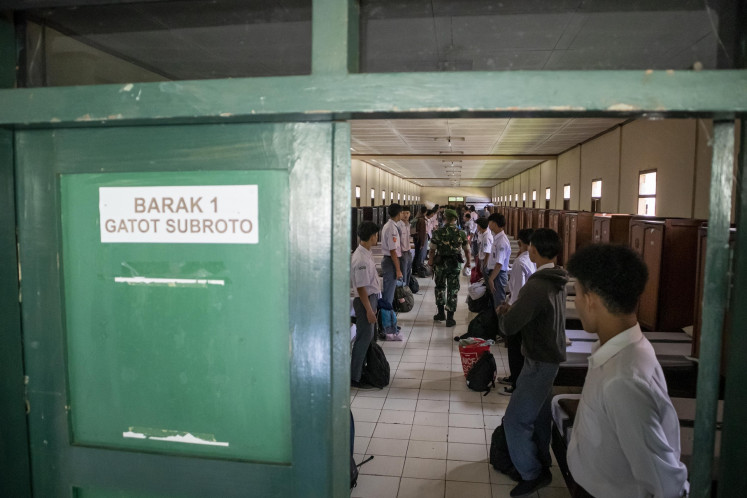Adriyanto Dewo: Firm on filmmaking
(Courtesy of LifeLike Pictures)The 30-year-old filmmaker said he was overflowing with excitement and enthusiasm about making the big move
Change text size
Gift Premium Articles
to Anyone
 (Courtesy of LifeLike Pictures) (Courtesy of LifeLike Pictures)
(Courtesy of LifeLike Pictures) (Courtesy of LifeLike Pictures)
(Courtesy of LifeLike Pictures)
The 30-year-old filmmaker said he was overflowing with excitement and enthusiasm about making the big move.
'This is what I've been preparing myself for for so many years. I'm ready for this,' said Adri, his nickname.
Tabula Rasa begins its 26-day shooting schedule on Jan. 26 on set and location in Jakarta; Depok and Bogor in West Java; and Serui in Papua.
'I will have almost a month to shoot. It is a quite ideal amount of time. Many Indonesian films nowadays are shot in only 10 days to reduce budget,' he said.
The film is the third project from film producer Sheila Timothy, whose company Life Like Pictures produced Pintu Terlarang (The Forbidden Door, 2009) and Modus Anomali (2012).
Tabula Rasa tells the story of a young Serui man Hans who is at the lowest point of his life when he faces failure in pursuing his dream in Jakarta. Hans meets Mak Uwo, a woman from Padang, West Sumatra, who also recently moved to the capital.
Hans later works with Mak Uwo at her lapau (traditional Minang restaurant) and finds new hopes and dreams.
The movie is described as a family drama in the sub-genre of food film because it puts traditional Minang cuisine and philosophy at the center of the story.
'I don't think that there has been an Indonesian feature film that is very focused on cuisine,' Adri said.
The film, he explained, was prepared meticulously before production began.
'We spent around one and a half years to develop the story, research the cultural and culinary aspects of Minang food, casting the actors and doing workshops,' Adri said.
The young director, who graduated from the film directing program at the Jakarta Institute of Arts, said that he agreed to work on the movie because it offered something new and different.
'There are many elements in the movie, especially those related to Indonesian culture, but the story is simple in its delivery and, hopefully, engaging,' he said.
Prior to the project, Adri has been directing various short films, music videos and television programs.
In 2011, he received the Best Director award at the sixth Indonesian Film Festival in Melbourne, Australia, for his short film Song of the Silent Heroes.
In 2012, he directed two short films for two omnibuses, namely, Ghost Market, a segment in horror anthology Hi5teria, and the Waiting for Colors vignette in the package drama Sanubari Jakarta (Heartbeat of Jakarta).
Adri said that he began treading the path of filmmaking after having an epiphany.
As a teenager, he was attracted to drawing pictures and had set his mind on studying animation at the Jakarta Institute of Arts.
'I love drawing. My dad, who is an architect, taught me a lot of the techniques,' he said.
Adri was in his first week of college when he saw The Bicycle Thief, a 1948 film by Italian director Vittorio De Sica.
The movie, set in post-World War II Rome, is about a poor father that has to find his stolen bicycle, which he needs to keep a job and save his young family.
'The story was simple, but it was very touching. The movie was made in the 40s, yet people can still relate to it. I was amazed by the power of film and decided then to switch to film directing,' Adri said.
He admitted that he had not seen many films during his teens. 'Only during my studies did I begin exposing myself to European and Asian films. Watching these films strengthened my love of cinema,' he said.
Adri said he loved the works of Indonesian filmmaker Nan T. Achnas, American independent film director Jim Jarmusch and Japanese director-actor Takeshi Kitano.
'They share similarities in that their works are usually about simple things and are not very dramatic like your standard Hollywood movie, but they are still touching for the audience,' he said.
After completing Tabula Rasa, Adry said he wanted to focus on writing stories as much as he could. 'It would be easier to approach investors and producers if I already had good stories on hand,' he said.
Adri realized that the audience for Indonesian films was dwindling because there was little variety in Indonesian movies offered in the cinemas.
'Many good Indonesian films do not make it through to the local cinemas,' he said.
The director said that although Indonesian filmmakers needed to work hard to regain trust from the Indonesian audience, filmmaking would be his life.
'I have made my choice, I am very optimistic about it,' he said.









